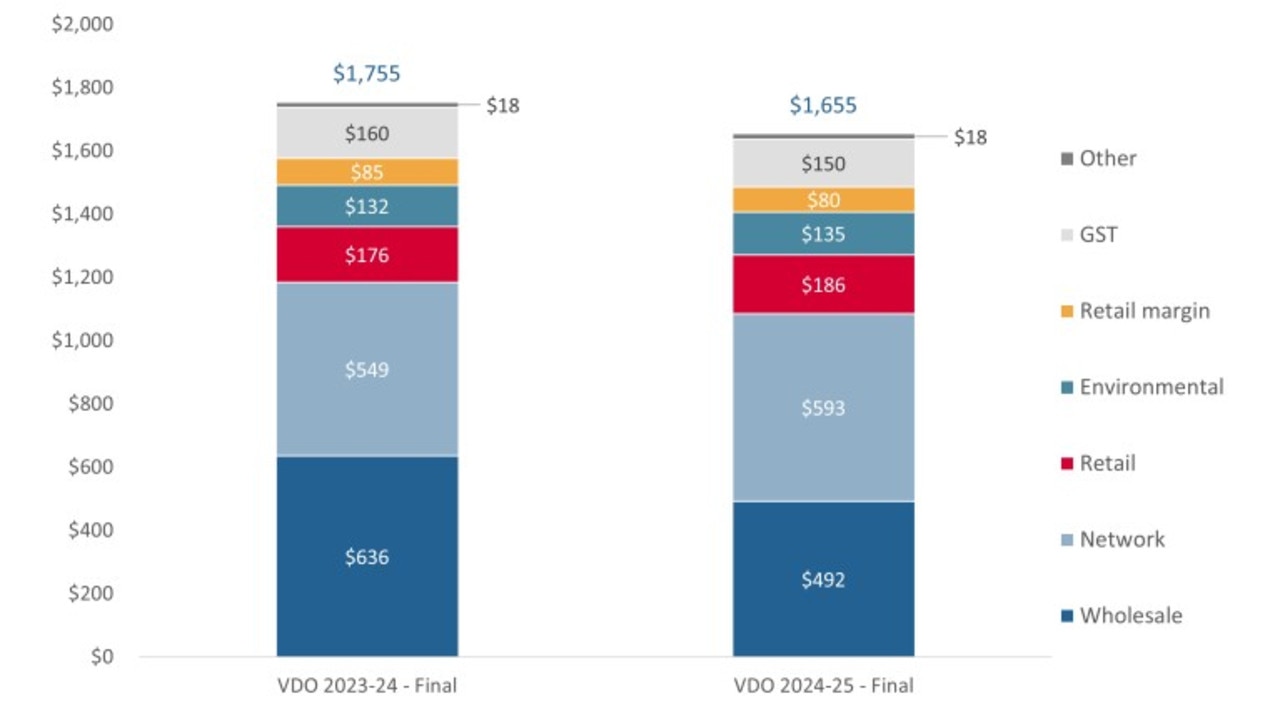Essential Services Commission locks in cut to electricity default offer
Relief is in sight for Victorian households slugged with steep hikes in their electricity bills after the Essential Services Commission announced that basic energy deals, the Victorian Default Offer, will fall from next month.
Relief is in sight for struggling Victorian households after the state’s electricity regulator announced that basic energy deals would soon fall by $100 a year.
The change, set to kick in from July 1, will mean the average bill for the 340,000 residential customers on “default” regulated offers, with a 4000kWh consumption, would fall to $1655 a year.
The regulated offer also sends a signal that other more competitive deals, which the vast majority of Victorians have, should follow suit.
Significant falls in wholesale prices — which were at historic highs due to international conflict and turmoil in the local energy market — enabled the cut, which was slightly offset by increase in the cost of poles and wires, green schemes, and retail costs.
The 58,000 small businesses on the regulated power deal will get a $260 annual reduction to their bill, about a 7 per cent cut.

Essential Services Commission chief executive Sarah Sheppard said the decision was good news for Victorian consumers.
“A typical domestic customer on the Victorian Default Offer will save $100 a year, and a typical small business customer will save $260 a year,” she said.
Ms Sheppard said the decision was based on key market data, feedback from stakeholders, and the final network tariffs – the costs of delivering energy to properties via poles and wires – for 2024–25 approved by the Australian Energy Regulator in May.
Those network tariffs had risen, pushing up that proportion of customer bills.
Household bills are still significantly higher than five years ago, when the VDO was about $1400.
“We heard strong feedback from stakeholders that cost-of-living pressures continue to make it difficult for many in our community,” Ms Sheppard said.
“Affordability and consumer protections remain a key focus for the commission.”
The commission pointed out that in addition to regulated deal price reductions, every customer would get a $300 energy bill rebate announced in the federal budget.
Ms Sheppard said those experiencing financial pain should check if they’re eligible for Victorian Government energy concessions and Utility Relief Grants.


Electricity retailers are also obligated to tell customers if they could offer them a better deal, because the Victorian Default Offer was a reference point for prices rather than the cheapest on the market, and customers in financial distress should ask them for help.
Victorian Council of Social Services chief executive Juanita Pope said the 6 per cent reduction in the state’s reference price was welcome, the savings would be “quickly obliterated” by other cost of living pressures.
“This modest reduction will save households about $2 a week, and be quickly obliterated by rising expenses like food, rent and petrol,” Ms Pope said.
“Given last year’s VDO decision increased baseline bills by $352, prices are still going in the wrong direction.”
Power prices have become a political battleground in the past two years, after the Albanese Government promised to lower bills by $275 — a promise not yet met.
The government was criticised for providing a $300 rebate in its Budget that was not means tested, but which it said would put downward pressure on inflation and was easier to distribute if it was a flat payment to everyone.
Federal Energy Minister Chris Bowen welcomed the reduction.
“Today’s figures show a welcome downward trend for prices but we know there’s more to do which is why we’re delivering our reliable renewables plan and providing direct energy relief for every household energy bill,” he said.




